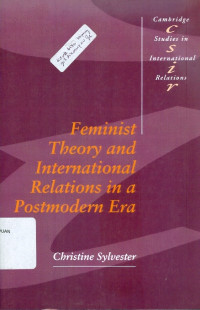
Text
Feminist theory and international relations in a postmodern era
This book argues that the identities and activities commonly associated with women have been eliminated from the theories formulated about international relations. The author points out that these theories often rely on the hidden activities of women and their assigned tasks in life to establish a sphere of politics that is for men only. Using case studies of the Greenham Common Women's Peace Camp in the UK, and of Zimbabwean women's efforts to secure international funding for producer cooperatives, the book explores the possibility of undermining the masculine identity politics of international relations. This book evaluates the major debates around which the discipline of international relations has developed in the light of contemporary feminist theories. The three debates (realist versus idealist scientific versus traditional modernist versus postmodernist) are discussed against the backdrop of feminist activities and theories that were ignored as the field unfolded, and in the context of feminist empiricist standpoint and postmodern epistemologies of the moment. These draw attention to an identity politics in our theories that often resists debate. Christine Sylvester elaborates a feminist method of empathetically cooperative conversation which can help us to appreciate practices in international relations that challenge the foundations of the field. She illustrates that method with reference to the Greenham Common Women's Peace Camp (in the UK) and the efforts of Zimbabwean women to negotiate international funding for their local producer cooperatives
Availability
| KP.II-00031 | KP.II SYL F | My Library | Available |
Detail Information
- Series Title
-
-
- Call Number
-
KP.II SYL f
- Publisher
- Oakleigh : Cambridge University Press., 1994
- Collation
-
xi, 265 Hal.: 23 cm
- Language
-
English
- ISBN/ISSN
-
0-521-459-84-2
- Classification
-
KP.II
- Content Type
-
-
- Media Type
-
-
- Carrier Type
-
-
- Edition
-
-
- Subject(s)
- Specific Detail Info
-
-
- Statement of Responsibility
-
-
Other version/related
No other version available
File Attachment
Comments
You must be logged in to post a comment
 Computer Science, Information & General Works
Computer Science, Information & General Works  Philosophy & Psychology
Philosophy & Psychology  Religion
Religion  Social Sciences
Social Sciences  Language
Language  Pure Science
Pure Science  Applied Sciences
Applied Sciences  Art & Recreation
Art & Recreation  Literature
Literature  History & Geography
History & Geography